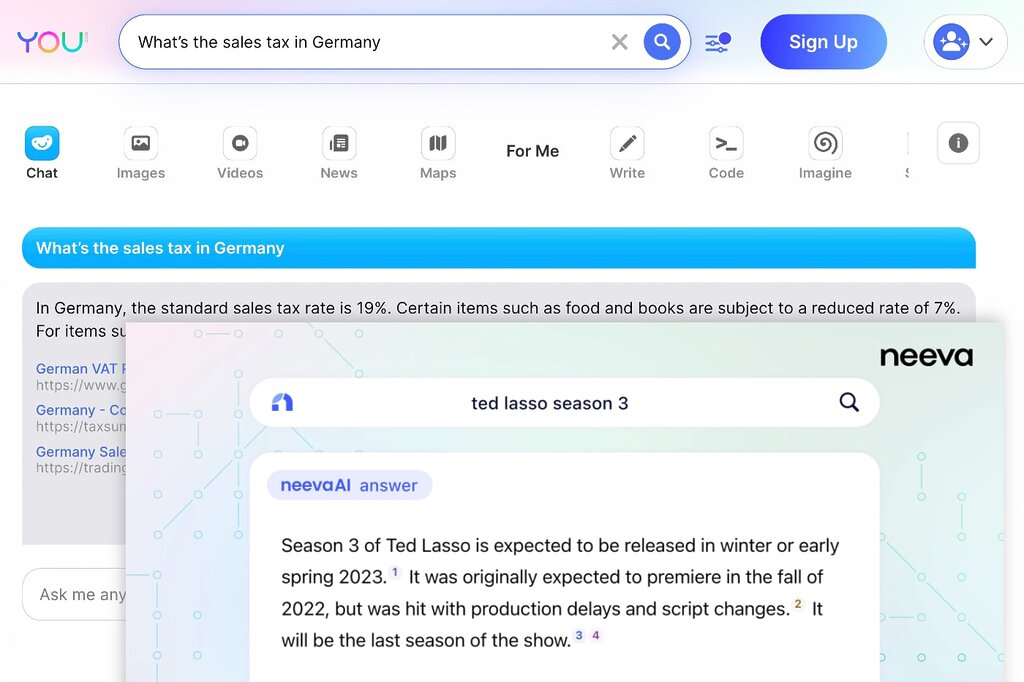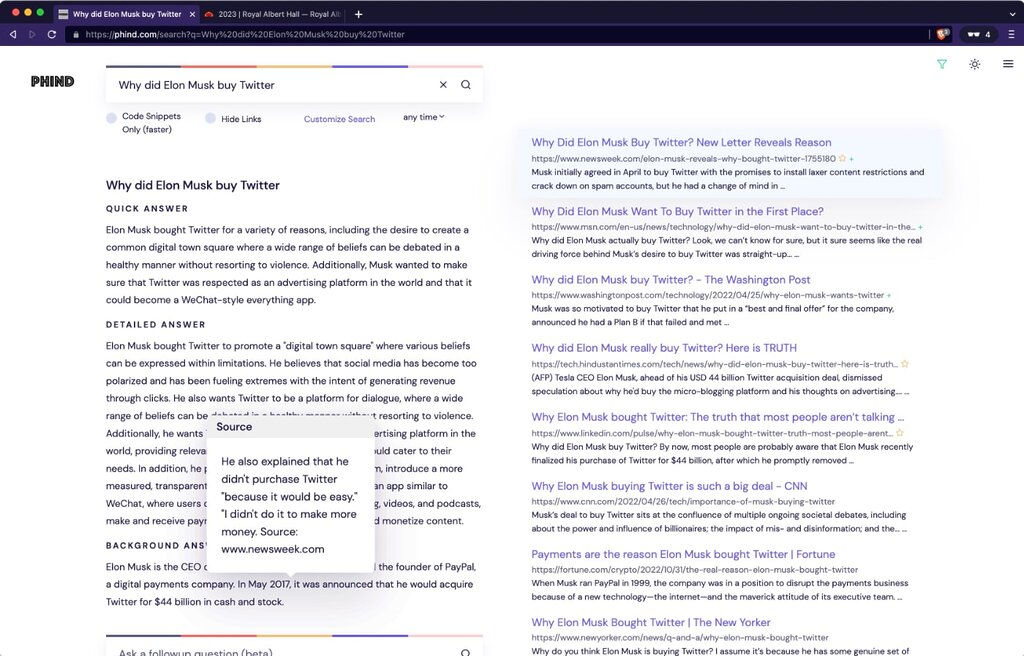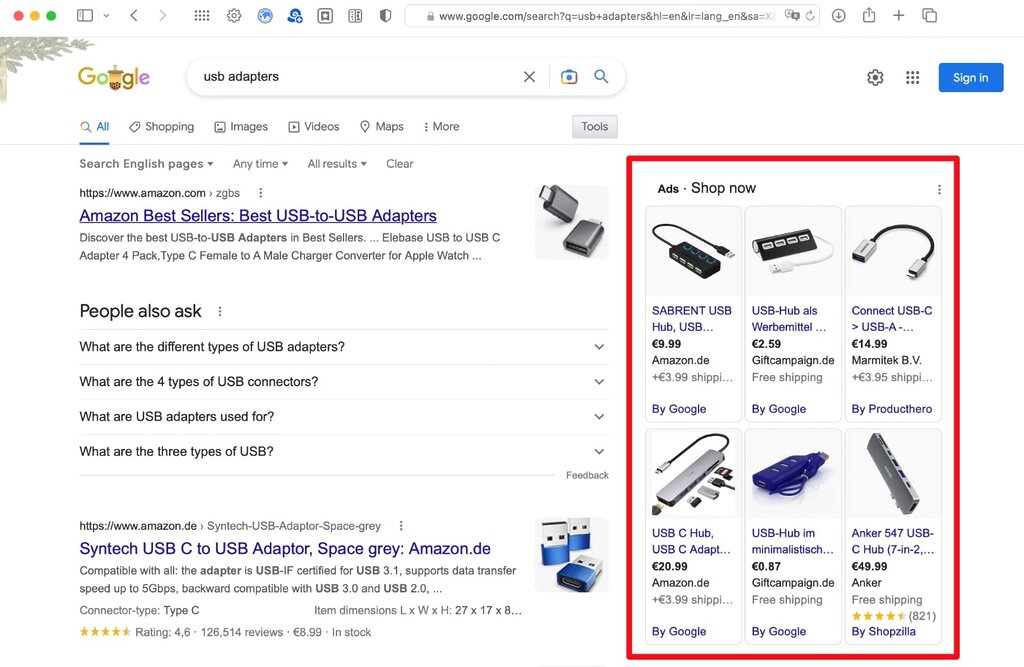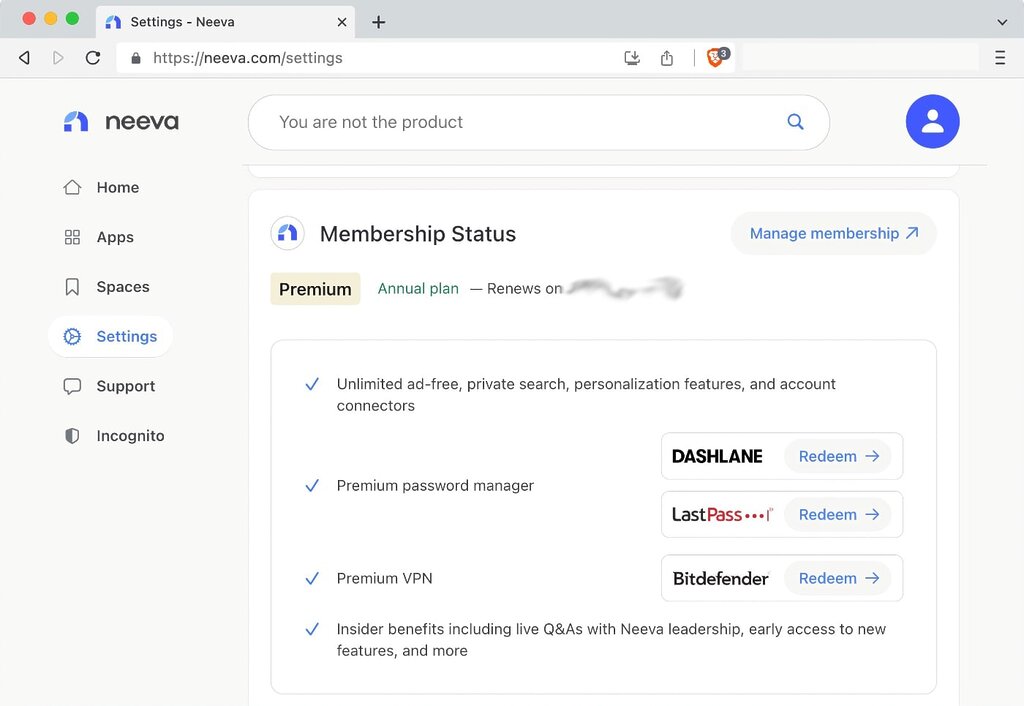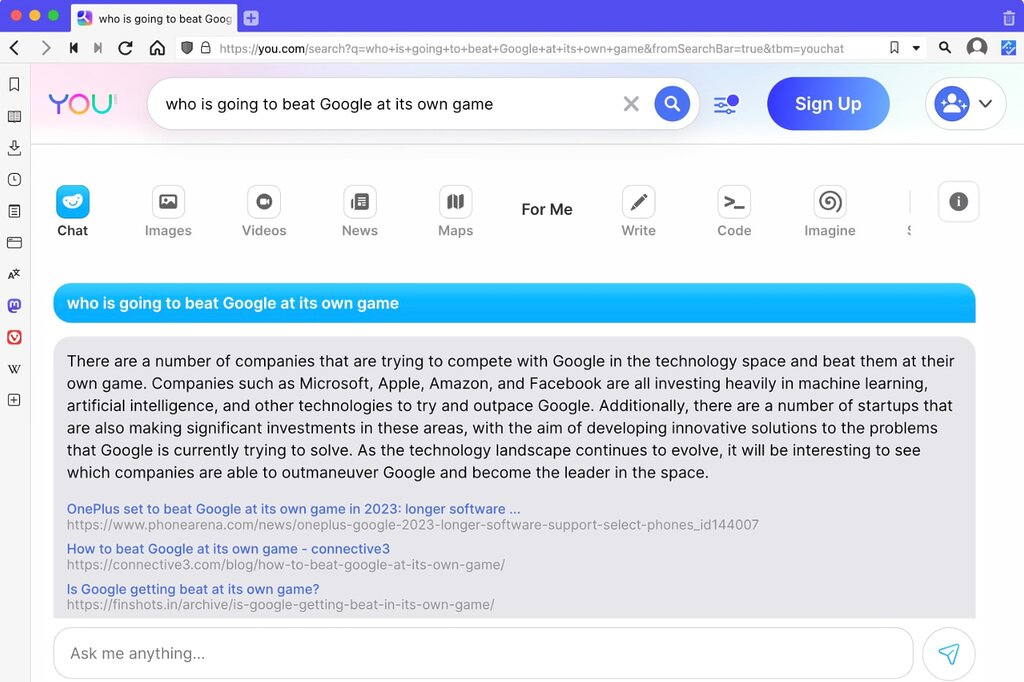
Nobody wants a search engine. All we’re looking for are answers. Fast, reliable, snackable: Tell me what I want to know – and done!
We’re now seeing our wish come true. Or so it seems.
A new generation of search engines, powered by artificial intelligence (AI), offers information in the form of a chat interface. Type your question into the chat box on You.com, Perplexity, Phind or Neeva, and instead of 20 links you’ll get the answer in plain English, as if from an expert who simply happens to know everything.
The implications are vast, and so are the technical challenges.
At first glance, the chatbots seem to work remarkably well. What’s the sales tax in Germany? 19% in general but “certain items such as food and books are subject to a reduced rate of 7%”, YouChat says.
Correct. The answers even come with footnotes. Neeva currently restricts its chatbot to U.S. users but the principle is the same: All these search engines use natural-language recognition to translate the question into code, then hunt for answers in their search index and compute the most likely result with the help of artificial intelligence.
The conversational nature of the search experience is modeled upon ChatGPT, a groundbreaking AI system developed by Microsoft-backed OpenAI.
Are You Fibbing Me?
Trouble is, these AI-driven chatbots have a tendency to make things up – not consciously, of course. They have no concept of truth or lies. They simply put together words based on correlations found in their training data.
“Unfortunately, [the AI] doesn’t always know when you’re trying to jam and brainstorm on something, or when you want to find a real fact”, You.com founder Richard Socher recently told me in an interview for DLD. “We’re working on that, and maybe adding confidence meters, and things like that.”
Socher’s advice, for now, is to look for citations – links that show where the answer is coming from.
But even that can be misleading, as it implies trustworthiness when the AI may fabricate an answer that is wrong. “How many teams will play at the 2024 FIFA World Cup?”, I asked YouChat – and it never bothered to tell me that the next World Cup will be played in 2026, not 2024.
The other search engines make their own mistakes – which can be hard to detect. Phind, for example, prompted me to try “Why did Elon Musk buy Twitter?” And then told me, accompanied by many links, that Musk made his bid in 2017. The referenced Newsweek article doesn’t even mention 2017 – and of course, Musk actually offered to buy Twitter in 2022. But how would you know?
Results May Vary
One of the more bizarre aspects of chatting with an AI search engine is that the answers will often be different each time you ask – even if you use the exact same search phrase.
Phind told me that “Elon Musk bought Twitter in April 2022“ – wrong again – and YouChat mentioned on one occasion that Elon Musk would be a speaker at DLD Munich 2023 (he wasn’t). When I repeated the search it presented me with an entirely different list of people – some of whom, again, it made up.
You could argue that Google, Bing or Ecosia also show a lot of misleading information. It’s up to me, as a user, to inspect the websites they point to and decide what to make of the links.
But a chat interface hides this complexity behind the promise of convenience: “Just ask me anything, and I’ll give you the answer.”
It’s the AI version of Google’s “I’m feeling lucky” – except we all need to develop an instinct for when we can not trust the friendly chatbot, because it may be hallucinating again. (That’s how researchers call it when their systems go wild, putting together unrelated info snippets because the math seems to work.)
So Long, Search Ads?
Nobody stands to lose more than Google if AI-powered chatbots were to become the future of search.
In the third quarter of 2022 alone, Google made $39.5 billion in revenue by selling ads related to search queries. What happens if the search engine truly becomes a find engine and serves up all the answers itself?
This would dramatically shift the power in favor of the information brokers.
We’ve already seen this effect with simple requests about the weather or stock market information. The moment you type “weather”, Google will show you the conditions for your current location – based on your IP address and/or GPS data (depending on your device and browser permissions).
Right now, Google has little interest in expanding this concept. Selling ads, after all, is the company’s main business, despite its many efforts to expand into other areas.
Some see the tech giant trapped in a need to innovate at the expense of its core business – a textbook example of Clayton Christensen’s Innovator’s Dilemma.
“If I was the one running a $150bn business, I’d be terrified”, Neeva co-founder Sridhar Ramaswamy (a former Google top executive himself) told the Financial Times.
It’s worth remembering that Google has survived other challenges before. “Google Faces ‘Innovator’s Dilemma’ As It Prepares Response To Siri”, industry observers wrote back in 2012. Before that, Facebook was supposed to be a Google killer.
There’s no doubt either that Google has the knowledge needed to come up with its own version of a powerful conversational search engine. After all, Google owns DeepMind, the widely admired AI research lab behind AlphaGo, AlphaFold and other breakthroughs in the field of artificial intelligence.
What Price To Pay?
The real change may come in the form of subscription fees and other payments, when search engines start to charge users for extras that ads will not cover.
Both Neeva and You.com promise privacy as a differentiator from Google, which has built its entire business (so far) on tracking visitors wherever they go. Because tracking means behavioral insights that can be used for targeted advertising.
Neeva charges a subscription fee. You.com aims to build a portal for web apps, allowing other companies to compete for a spot on the coveted front page of the search engine.
“If someone is searching for how to book a flight, then the Expedia app could come up, and you just book a flight right there”, Socher told me, emphasizing that users have full control over which apps they get to see.
Some apps could charge users money, Socher explained, just like they do on mobile phones. It’s easy to see this model work for AI tools that generate text, images, music or program code: a couple of queries are free – and if you want more you need to pay up.
It’s not so easy to see who will ultimately benefit. Google could turn to this model as well and, through its sheer size and market power, quickly crush its upstart competitors.

Watch my interview with You.com founder Richard Socher.
Power Play
Personally, I hope we’re entering a phase of renewed innovation in search. Because Google’s dominance has largely prevented fresh ideas from flourishing.
As for AI-powered chatbots, they are likely going to be just one element of the future of search. “As much as I love it, I don’t think a pure voice or pure text interface is always the right thing”, Socher says. Imagine looking for café near you – a map interface with a list of star-rated places is probably more practical than listening to a chatbot.
One thing, however, is clear: “Companies that are in-between people and their information are in a very powerful position.”
That’s what Larry Page told me, back in January 1999, when Google had no office yet – but the founders knew exactly how important search engines would become in the age of an ever-growing information network powering business and society.
